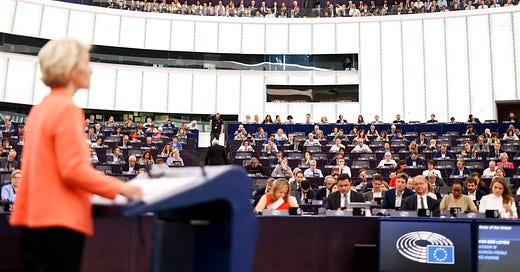SOTEU & Treaty Change—what it means for EU public affairs
An eventful week for the European Union, as the President of the Commission addresses the EP and proposals are made for treaty change, intertwining the discussions on enlargement and deepening.
There are decades where nothing happens, and there are weeks where decades happen.
This quote, attributed to Lenin, gives an accurate account of what happened to the European Union last week.
In two day, the EU saw the President of the Commission call for treaty change and the European Parliament propose a text to do just that.
Let’s assess what it means.
SOTEU 2023: more than a simple assessment
With the now traditional State of the European Union address, the President of the European Commission took stock of her action and of her college for the last five years. I am yet to find a commentator to criticise the level of what was achieved. The results that this Commission reached are outstanding, and it looks to me like Ursula von der Leyen delivered on her promise for a (geo-)political Union.
This excellent result leaves the outgoing President with a positive platform, should she decide to run for a second term.
Although Ursula von der Leyen did not announce her candidacy—neither directly or under veiled suggestions, she definitely has a positive track record she could use during a potential campaign. And a record that could directly feed into the EEP’s campaign.
No new policies?
We all knew, with less than 300 days to the European elections, that there would not be announcements for hallmark new policies.
And this is what Ursula von der Leyen did—sort of…
The head of the European executive did present a few initiatives that she intends to conclude by the end of her tenure. I’m thinking in particular of a “No Means No” law for protecting women from sexual violence, an inquiry into Chinese subsidies for electric vehicles, or Clean Transition Dialogs with the industry.
Although these are now flagship policies similar in scope to the Green Deal, they definitely indicate that the Commission intends to deliver until the very last day. Ain’t no rest for the lobbyists, I’m afraid.
Should you want to know more about the SOTEU and my assessment of Ursula von der Leyen’s assessment of her yearly address, I encourage you to look at this live commentary that I co-hosted with Quentin Deschandelliers, aka MEPassistant.
It was a very exciting exercise and a first for me, and Quentin’s analysis and expertise is unrivalled. Definitely worth a watch.
Treaty change: now a serious proposal?
But the SOTEU is not the only event that made the headlines.
A day after the SOTEU, five MEPs led by usual suspect Guy Verhofstadt presented a draft report on the amendment of the treaties.
This additional proposal follows the engagement of all EU institutions to give a follow-up to the recommendations of the Conference on the Future of Europe and the June 2022 resolution of the European Parliament calling for the trigger of Article 48 of the TEU to reform the treaties.
This week’s draft treaty, though, proposes concrete amendments to the treaties, such as renaming the European Commission into the European Executive and its president the President of the European Union, but also giving more powers to the European Parliament and the EU as a whole.

What now?
Thanks to its five rapporteurs from the EPP, S&D, Renew, the Greens, and The Left, the report already enjoys a broad political consensus. I don’t expect it will change much before the Plenary vote, scheduled for November.
Once the Parliament agrees on the proposal, the European Council will have no choice but to ask for a vote to open the reform process.
During the SOTEU address, Ursula von der Leyen voiced her support for treaty change and encouraged the call for a Convention.
Enlargement or deepening?
Both the SOTEU and the AFCO draft report re-opened the decades-long discussion on Enlargement versus Deepening.
But for the first time, it also linked the two together. As our Union is about to extend to more than 30 members, it understands that it will not be able to continue with its current institutions. Therefore, enlargement to Ukraine and the Western Balkans calls for deepening—and treaty change.
The mistake of Ursula von der Leyen was to call for enlargement without waiting for treaty change. I think we all understand how difficult this is. Even she recognised it, as she proposed the Commission to assess the feasibility of enlargement with a Union as it stands.






